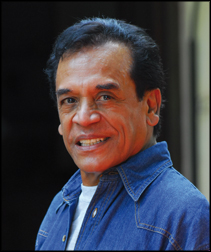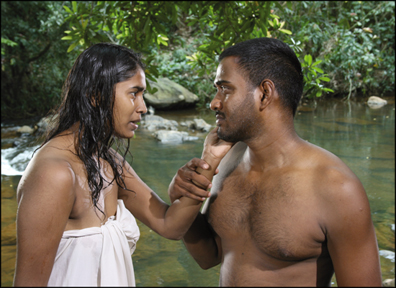|
'Alimankada' (Road from Elephant Pass):
Arduous road to realisation of humanity
by Ranga CHANDRARATHNE
 |
|
Chandran Rutnam |
After ten years of silence, veteran film producer and Director
Chandran Rutnam has re-emerged with his latest movie Alimankada (Road
From Elephant Pass) depicting a saga of the thirty year war. This film
now shown at Regal cinema portrays a story of the nation breathing fresh
air after the ending of a bloody war that ravaged the country. It is
timely that Rutnam comes out with a refreshing cinematic view of the
human relationships coloured by ethnicity and biases. 'Alimankada' was
the only official entry to the academy awards
Based on the award winning novel by Nihal de Silva, script writer and
the director has meticulously crafted a script which is true to the
sentiments articulated by the novelist with grotesque descriptions of
the vegetation, flora and fauna and exotic landscapes of the wild in the
Wilpattu sanctuary.
Breathtakingly beautiful with rare scenes from abounding natural
beauty of Sri Lanka, the film meanders through a path leading to the
realisation of human bondage, love, sorrow and unity in adversity that
make the very anatomy of any civilized society.
The civil war was at its peak, by the time Nihal de Silva penned the
novel that provides a rather fertile background to discuss the
inconvenient issues that draw apart two communities who lived in harmony
through generations and covers ethnic complexities that indirectly
fuelled the ideology of hate and terrorism. One of the important facets
of the film is that it is neither a carbon copy of the lengthly novel
nor is an eulogy of parties to the conflict. The film is a meaningful
narrative of human bondage which cuts across cultural, linguistic and
ethnic boundaries that coloured biases over the decades. In the
conventional sense, 'Alimankada' is not a war film but it is a brilliant
post war film which does amazingly contribute to the much-needed healing
process. More over it presents a postmortem on the ideology of the
conflict through intricately knitted scenes and meticulously crafted
dialogues which are rare amongst Sinhala cinema.
Although the narrative is interspersed with bizarre scenes, which
provide spice to the story, the crust of the narrative is to infuse
humanity into a war weary nation and to provide a refreshing post war
vision for a healing nation. At the hand of the script writer and
director, the war which has become a symbol of misery and blight of
contention over the years, has been inversed into a metaphor which
strangely unites two strange bedfellows, Sri Lankan Army officer (Ashan
Dias) and a female informant of the LTTE (Suranga Ranawaka). One of the
potent and lethal weapons that the LTTE possessed was its ideology of
separation which demonized the Sinhalese as a community against Tamils.
 |
|
Meeting of soulmates
across artificial boundaries |
In the course of the journey from Elephant Pass to Colombo, some of
the contentious issues of the conflict have been discussed. Suranga
Ranawaka, who brilliantly portrayed the role of a LTTE informant,
dominated the movie although the lead role of a captain was equally
played by Shan Dias. The film 'Alimankada' is marked for its
breathtaking cinematography which captured the intrinsic natural beauty
of Sri Lankan forest reserves and the use of natural sets which
synchronizes well with the very tempo of the story. This is a signature
feature of a master filmmaker and director Chandran Rutnam. One of the
important factors of the film is its time of release.
Highly militarized landscape
At the time Nihal de Silva penned the novel, LTTE's activities were
at its zenith. The terrorist outfit was, more or less, controlling the
North and East of the Country and purportedly preparing for a final
battle for a separate homeland. By the time the LTTE had overrun major
military camps such as Elephant Pass and built up the myth as an
invincible force. It was against this backdrop the novel 'Road from
Elephant Pass' was written.
The novel among other things has captured the ferocious nature of the
semi-desert landscape ravaged by war. Since the LTTE infiltrated into
forest reserves such as Wilpattu, the journey from Elephant Pass through
the wildlife sanctuary to Colombo was one fraught with danger. Besides
the guerillas, the forest reserve was infected with hunters. It was a
highly militarised landscape where each and everyone was looked at with
suspicion. Earlier films such as Vimukthi Jayasundara's 'Sulanga Enu
Pinisa' (The Forsekan Land) and Prassana Vithanage's 'Pura Handa
Kaluwara' were not allowed to be shown.
However, time has changed. Sri Lankan forces annihilated the LTTE
which was deemed as an invincible military outfit and described by
western media as the most dangerous terrorist outfit. Following the
victory euphoria swept the country and the militarization of collective
psyche is pervasive and manifested in much-eulogised military
exhibitions and society is grouped into two; patriots and traitors. Now,
the pervasive militarization in terms of military exhibitions
contributes not to 'triumphalism' as envisaged but to creation of a
social landscape with eerie military presence.
Though the narrative may not be applicable against this backdrop,
what is important here is that the people have to move on, out of the
war and into a landscape which is capable of healing the wounds and to
forge ahead in search of a collective identity and destiny. People could
no longer rest on laurels or overarching 'triumphalism' but to face the
hard facts of life.
Rutnam's movie 'Alimankada' is important in this respect. What is
important at this juncture is not to have reconciliation between
ethnicities, nationalities and 'reclaim' the forgotten cultural
landscape with resonant multiculturalism.
Apart from its visual excellence and masterly cinematic diction, 'Alimankada',
ends with a note of hope. One of the fundamental differences the film
from other so-called war films is that the crust of the film is a
celebration of life with love, sorrow and agony in separation against
the backdrop of a ferocious civil war. Captain falls in love with a
female LTTE informant during the course of the journey from Elephant
Pass to Colombo through the wildlife sanctuary is not a mere love affair
but an inevitable culmination of a process of reconciliation and triumph
of humanity over war.
Although the author Nihal de Silva is no more, he would, certainly,
be happy of the film based on his novel. "Road from Elephant Pass" is
one of the best fictions that came out of Sri Lankan writings in
English. Although it is a herculean task to turn such a work into
cinema, Chandran Rutnam has done justice to the novel converting it to a
cannon defining film in Sri Lankan cinema. The film has clearly
established the fact that Rutnam as a master of filmmaker and equally
gifted script writer.
|

